Charles E W Bean, Diaries, AWM38 3DRL 606/243B/1 - 1916 - 1926 - Part 10
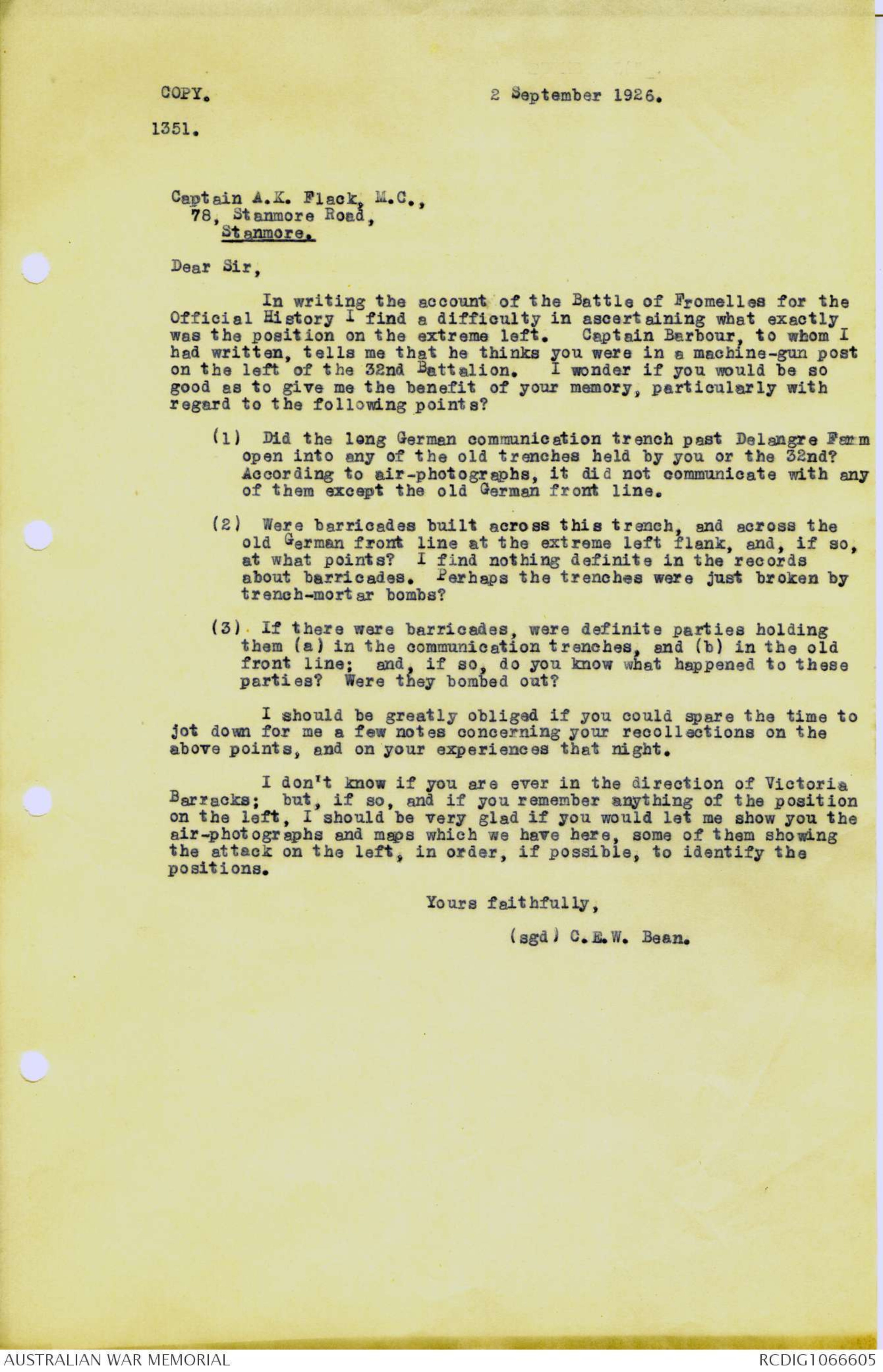
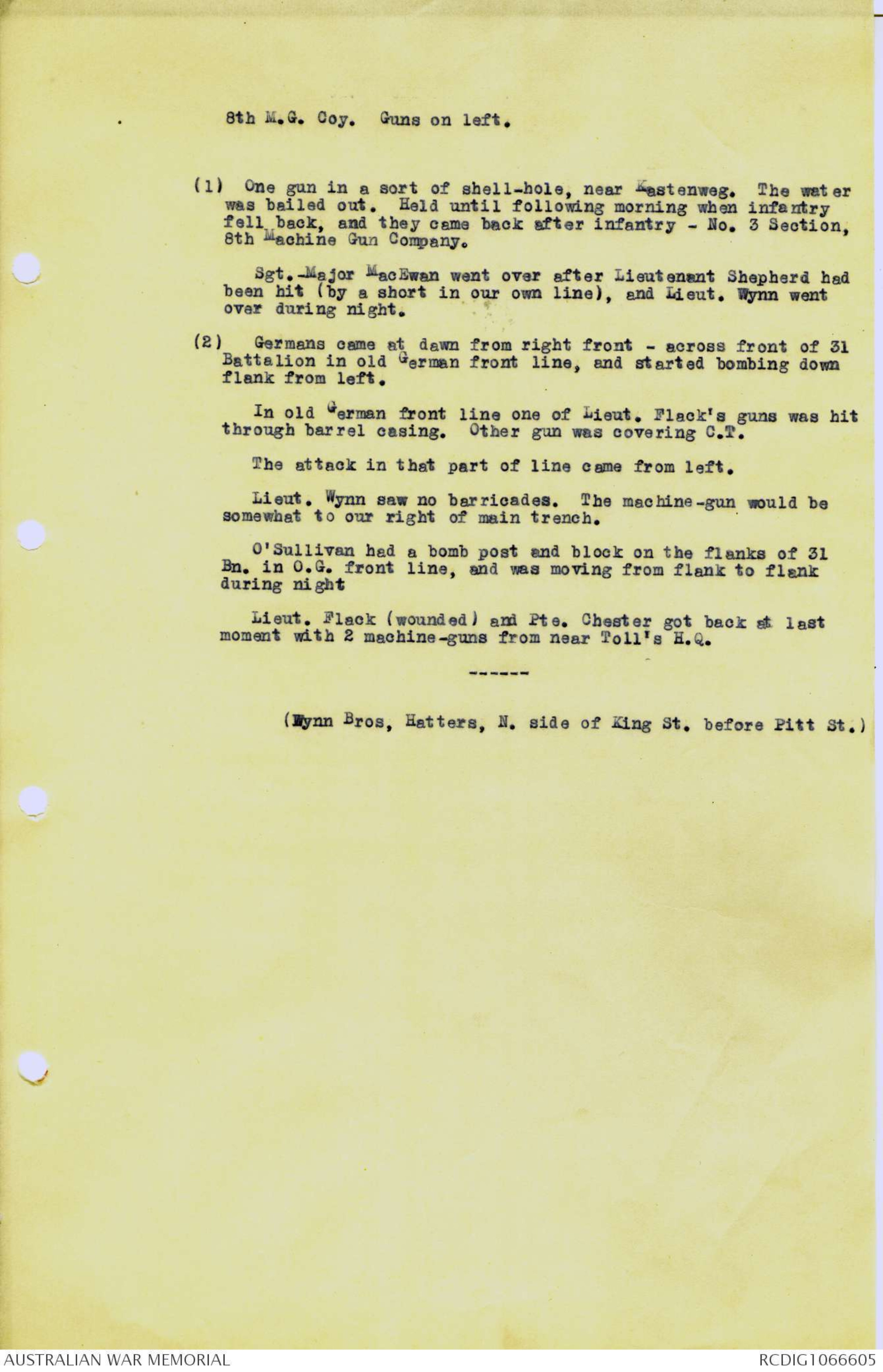
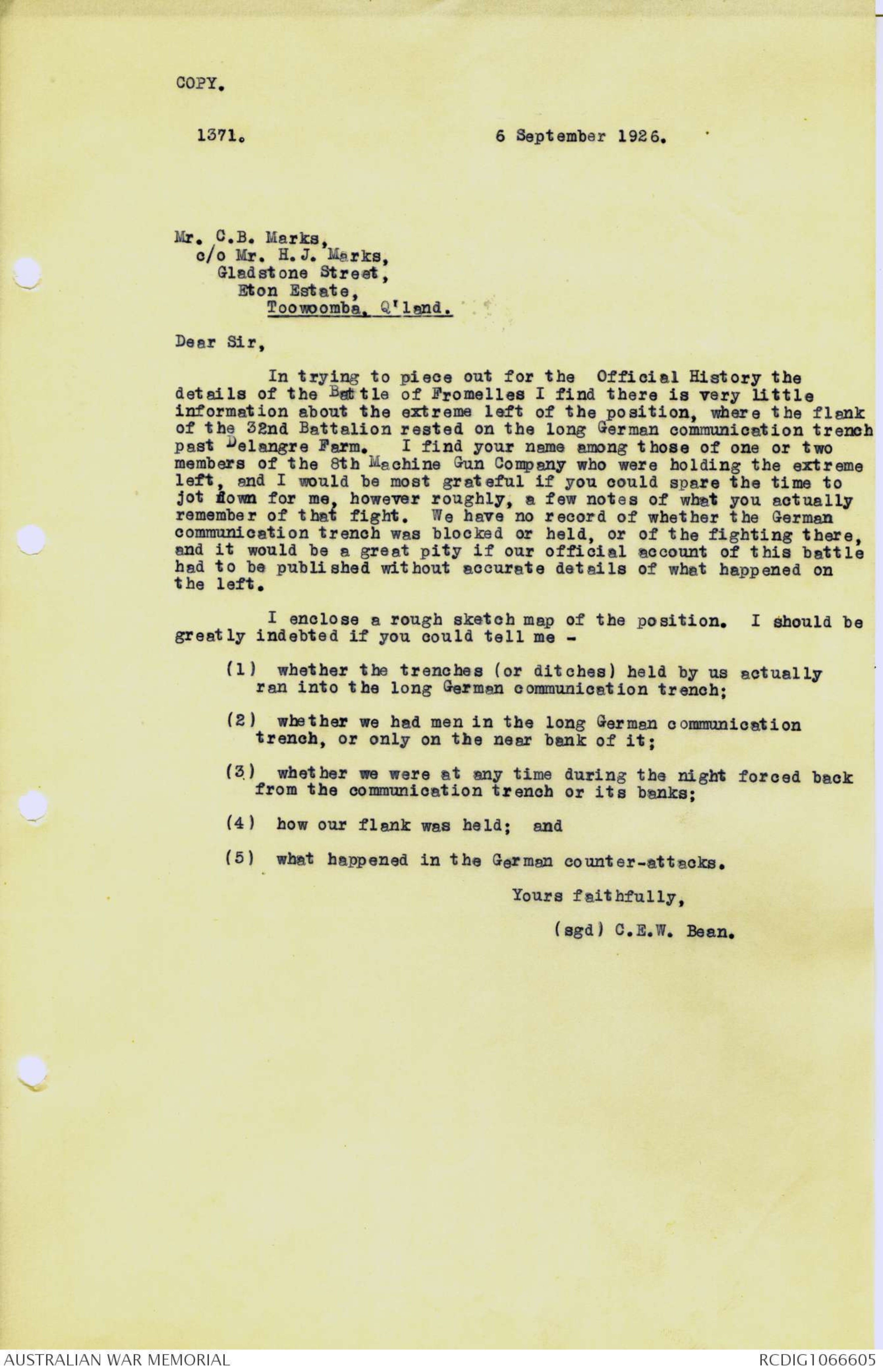
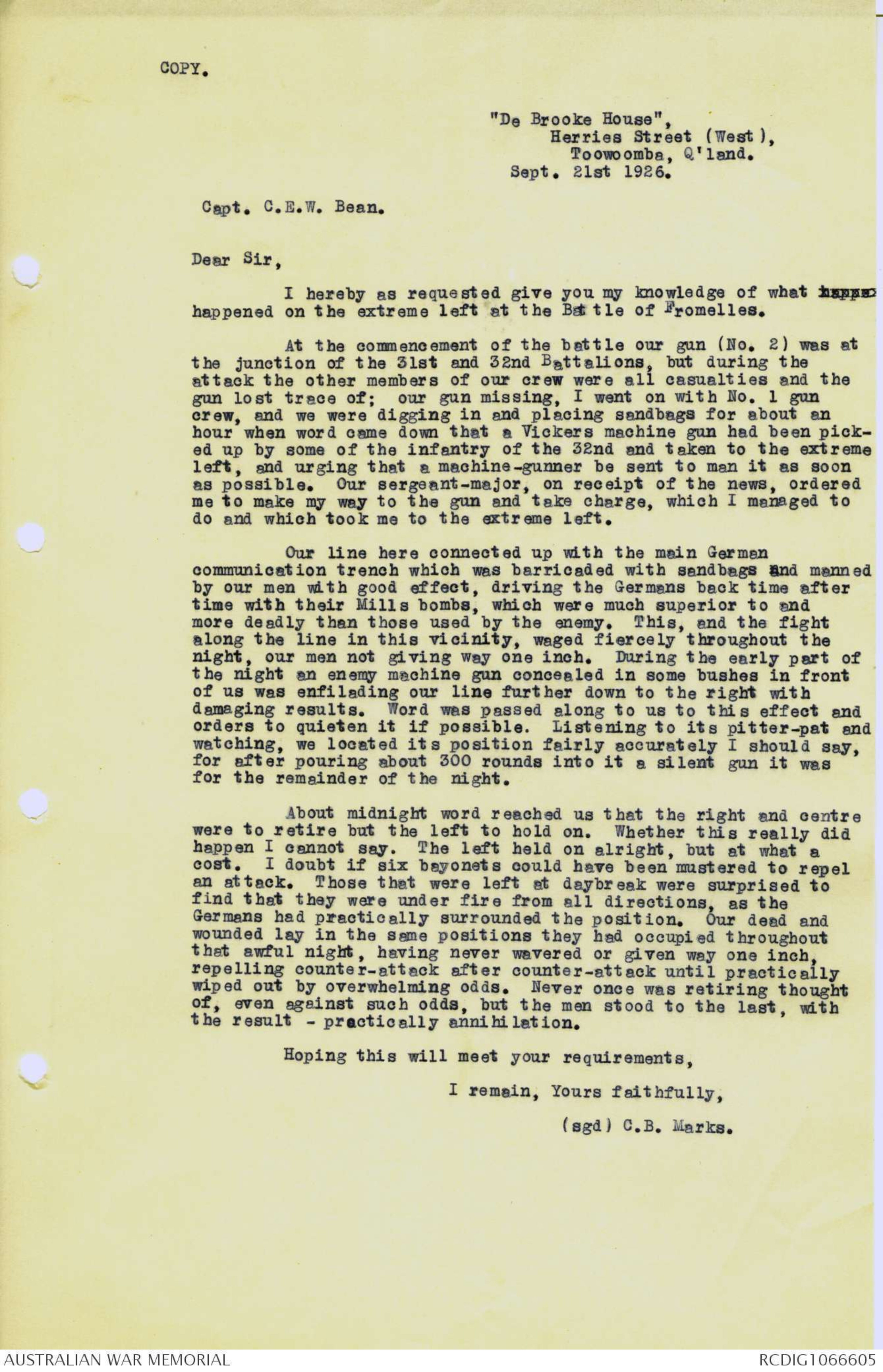
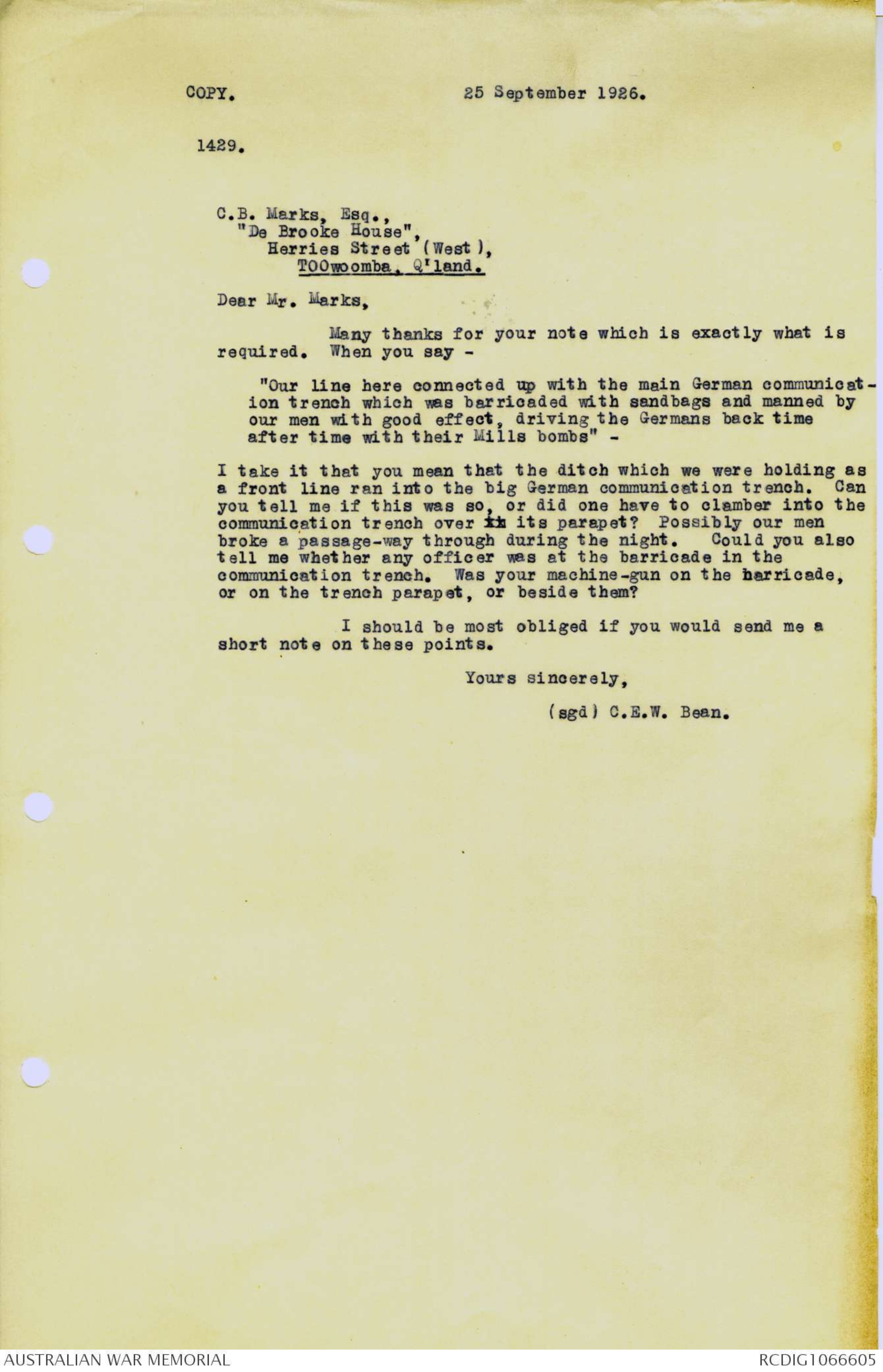
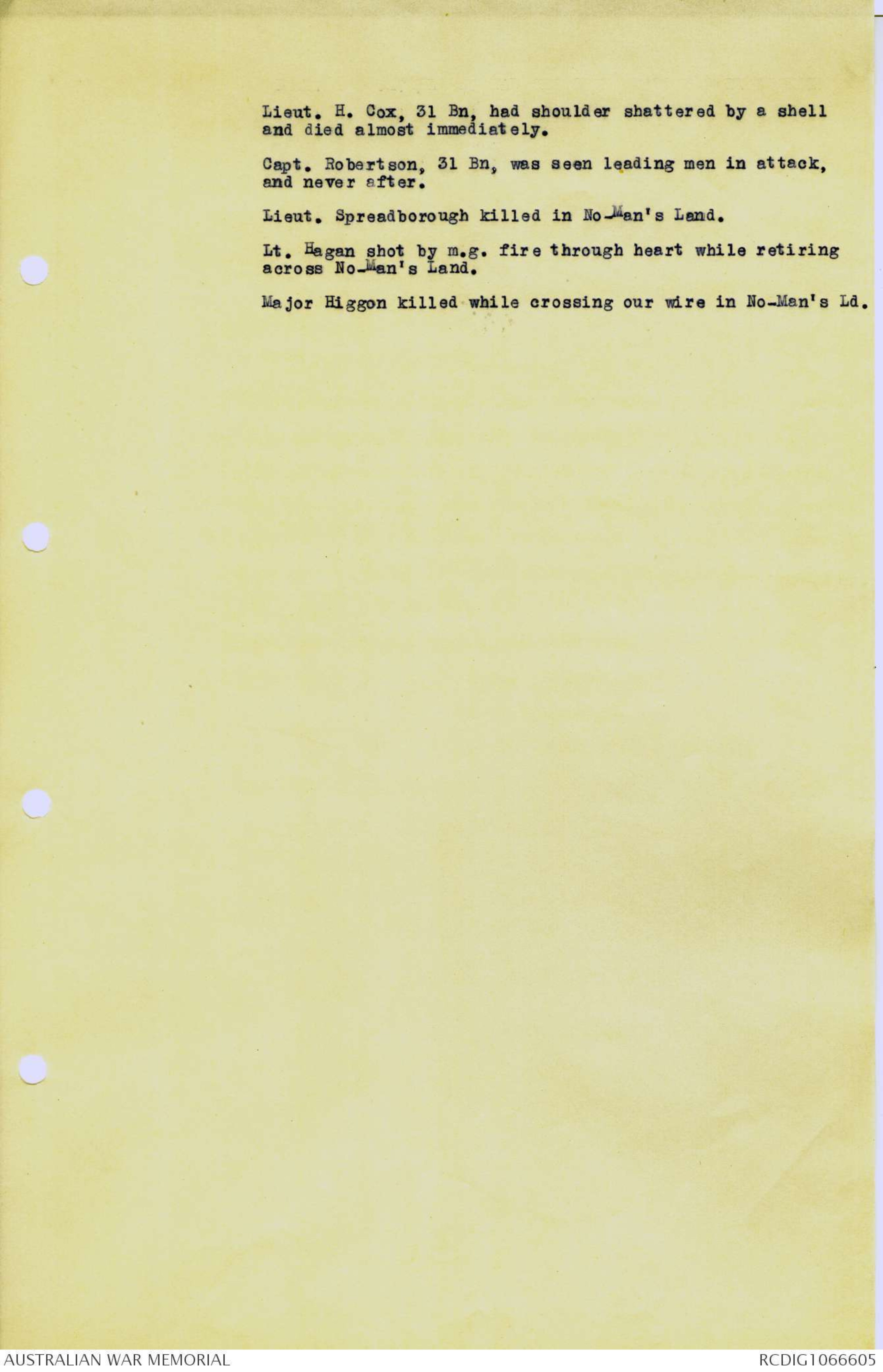
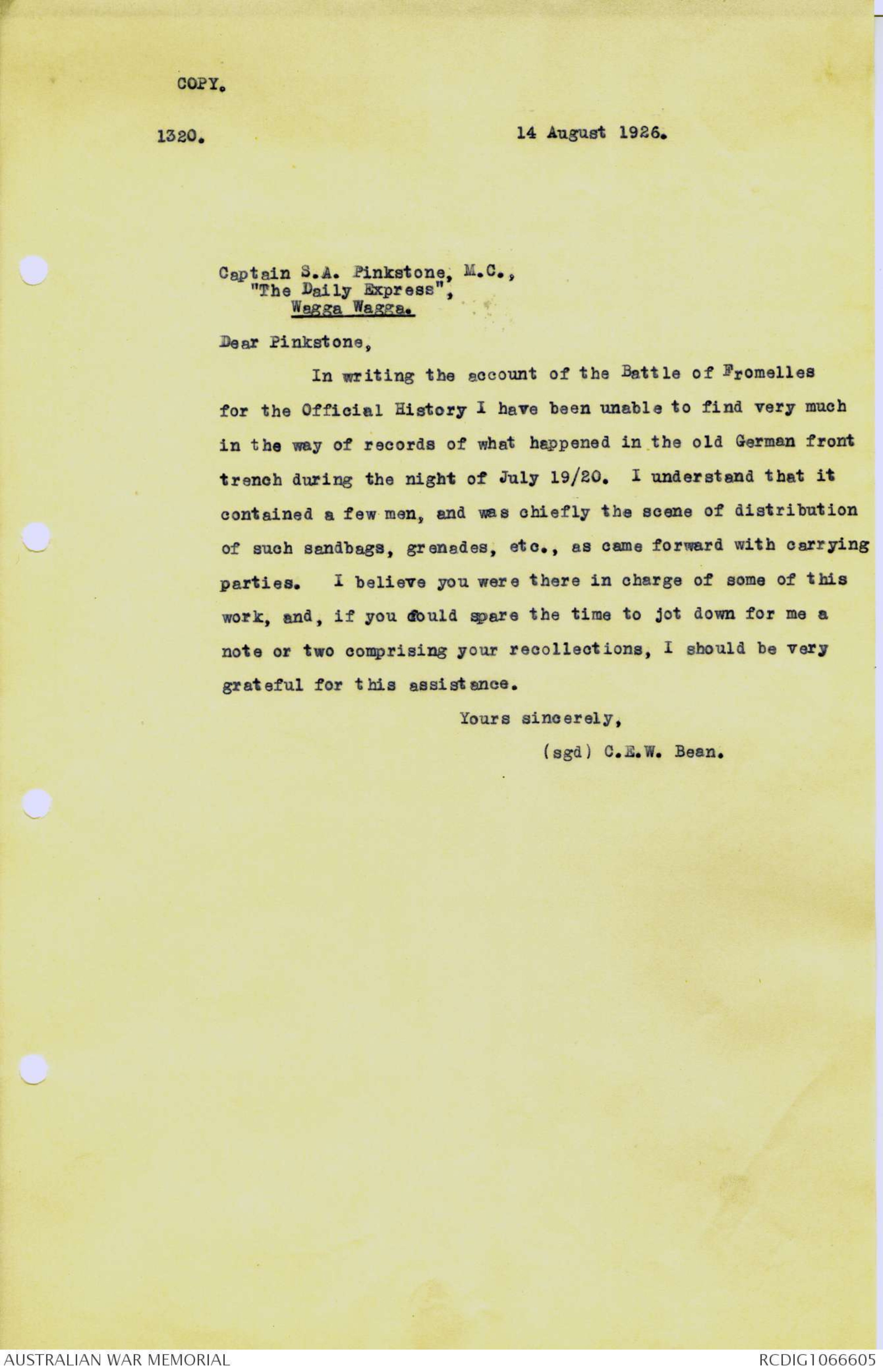
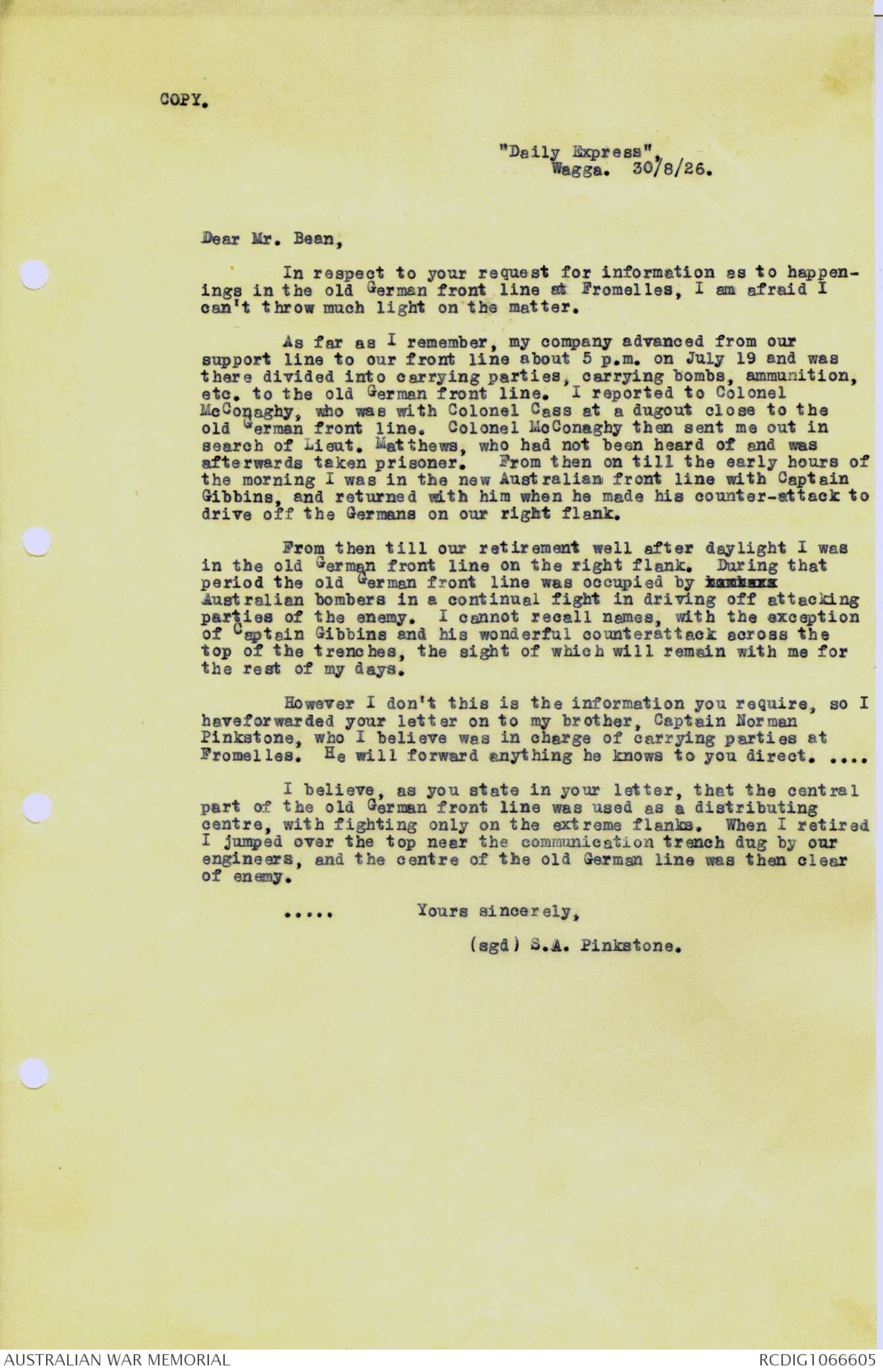
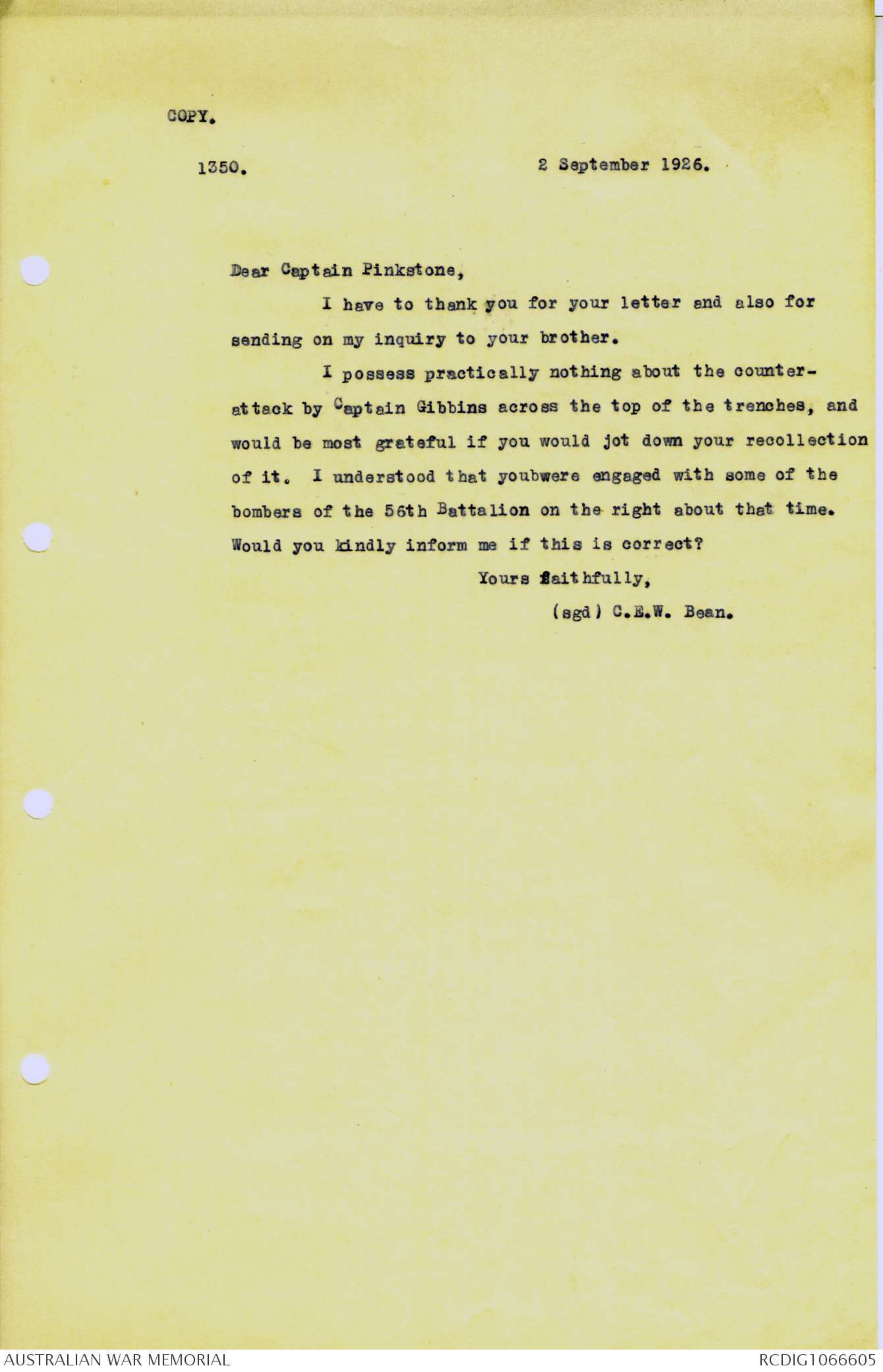
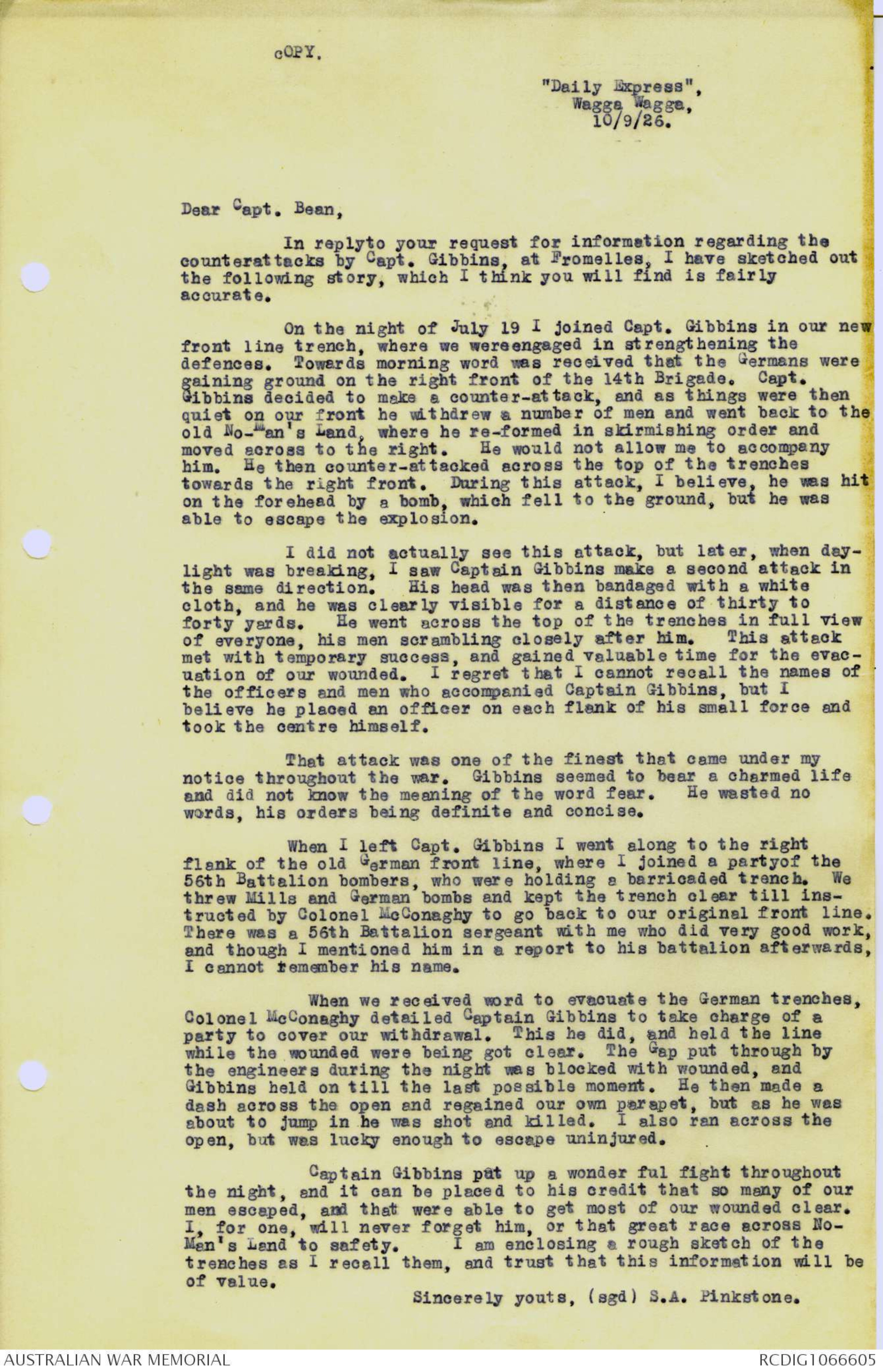
COPY.
2 September 1926.
1351.
Captain A.K. Flack, M.C.,
78, Stanmore Road,
Stanmore.
Dear Sir,
In writing the account of the Battle of Fromelles for the
Official History I find a difficulty in ascertaining what exactly
was the position on the extreme left. Captain Barbour, to whom I
had written, tells me that he thinks you were in a machine-gun post
on the left of the 32nd Battalion. I wonder if you would be so
good as to give me the benefit of your memory, particularly with
regard to the following points?
(1) Did the long German communication trench past Delangre Farm
open into any of the old trenches held by you or the 32nd?
According to air-photographs, it did not communicate with any
of them except the old German front line.
(2) Were barricades built across this trench, and across the
old German front line at the extreme left flank, and, if so,
at what points? I find nothing definite in the records
about barricades. Perhaps the trenches were just broken by
trench-mortar bombs?
(3) If there were barricades, were definite parties holding
them (a) in the communication trenches, and (b) in the old
front line; and, if so, do you know what happened to these
parties? Were they bombed out?
I should be greatly obliged if you could spare the time to
jot down for me a few notes concerning your recollections on the
above points, and on your experiences that night.
I don't know if you are ever in the direction of Victoria
Barracks; but, if so, and if you remember anything of the position
on the left, I should be very glad if you would let me show you the
air-photographs and maps which we have here, some of them showing
the attack on the left, in order, if possible, to identify the
positions.
Yours faithfully,
(sgd) C.E.W. Bean.
8th M.G. Coy. Guns on left.
(1) One gun in a sort of shell-hole, near Kastenweg. The water
was bailed out. Held until following morning when infantry
fell back, and they came back after infantry - No. 3 Section,
8th Machine Gun Company.
Sgt.-Major MacEwan went over after Lieutenant Shepherd had
been hit (by a short in our own line), and Lieut. Wynn went
over during night.
(2) Germans came at dawn from right front - across front of 31
Battalion in old German front line, and started bombing down
flank from left.
In old German front line one of Lieut. Flack's guns was hit
through barrel casing. Other gun was covering C.T.
The attack in that part of line came from left.
Lieut. Wynn saw no barricades. The machine-gun would be
somewhat to our right of main trench.
O'Sullivan had a bomb post and block on the flanks of 31
Bn. in O.G. front line, and was moving from flank to flank
during night
Lieut. Flack (wounded) and Pte. Chester got back at last
moment with 2 machine-guns from near Toll's H.Q.
(Wynn Bros, Hatters, N. side of King St. before Pitt St.)
COPY.
1371. 6 September 1926.
Mr. C.B. Marks,
c/o Mr. H.J. Marks,
Gladstone Street,
Eton Estate,
Toowoomba, Q'land.
Dear Sir,
In trying to piece out for the Official History the
details of the Battle of Fromelles I find there is very little
information about the extreme left of the position, where the flank
of the 32nd Battalion rested on the long German communication trench
past Delangre Farm. I find your name among those of one or two
members of the 8th Machine Gun Company who were holding the extreme
left, and I would be most grateful if you could spare the time to
jot down for me, however roughly, a few notes of what you actually
remember of that fight. We have no record of whether the German
communication trench was blocked or held, or of the fighting there,
and it would be a great pity if our official account of this battle
had to be published without accurate details of what happened on
the left.
I enclose a rough sketch map of the position. I should be
greatly indebted if you could tell me -
(1) whether the trenches (or ditches) held by us actually
ran into the long German communication trench;
(2) whether we had men in the long German communication
trench, or only on the near bank of it;
(3) whether we were at any time during the night forced back
from the communication trench or its banks;
(4) how our flank was held; and
(5) what happened in the German counter-attacks.
Yours faithfully,
(sgd) C.E.W. Bean.
COPY.
"De Brooke House",
Herries Street (West),
Toowoomba, Q'land.
Sept. 21st 1926.
Capt. C.E.W. Bean.
Dear Sir,
I hereby as requested give you my knowledge of what happenex
happened on the extreme left at the Bat tle of Fromelles.
At the commencement of the battle our gun (No. 2) was at
the junction of the 31st and 32nd Battalions, but during the
attack the other members of our crew were all casualties and the
gun lost trace of; our gun missing, I went on with No. 1 gun
crew, and we were digging in and placing sandbags for about an
hour when word came down that a Vickers machine gun had been picked
up by some of the infantry of the 32nd and taken to the extreme
left, and urging that a machine-gunner be sent to man it as soon
as possible. Our sergeant-major, on receipt of the news, ordered
me to make my way to the gun and take charge, which I managed to
do and which took me to the extreme left.
Our line here connected up with the main German
communication trench which was barricaded with sandbags and manned
by our men with good effect, driving the Germans back time after
time with their Mills bombs, which were much superior to and
more deadly than those used by the enemy. This, and the fight
along the line in this vicinity, waged fiercely throughout the
night, our men not giving way one inch. During the early part of
the night an enemy machine gun concealed in some bushes in front
of us was enfilading our line further down to the right with
damaging results. Word was passed along to us to this effect and
orders to quieten it if possible. Listening to its pitter-pat and
watching, we located its position fairly accurately I should say,
for after pouring about 300 rounds into it a silent gun it was
for the remainder of the night.
About midnight word reached us that the right and centre
were to retire but the left to hold on. Whether this really did
happen I cannot say. The left held on alright, but at what a
cost. I doubt if six bayonets could have been mustered to repel
an attack. Those that were left at daybreak were surprised to
find that they were under fire from all directions, as the
Germans had practically surrounded the position. Our dead and
wounded lay in the same positions they had occupied throughout
that awful night, having never wavered or given way one inch,
repelling counter-attack after counter-attack until practically
wiped out by overwhelming odds. Never once was retiring thought
of, even against such odds, but the men stood to the last, with
the result – practically annihilation.
Hoping this will meet your requirements,
I remain, Yours faithfully,
(sgd) C.B. Marks.
COPY. 25 September 1926.
1429.
C.B. Marks, Esq.,
"De Brooke House",
Herries Street (West),
TOOwoomba, Q'land.
Dear Mr. Marks,
Many thanks for your note which is exactly what is
required. When you say-
"Our line here connected up with the main German communication
trench which was barricaded with sandbags and manned by
our men with good effect, driving the Germans back time
after time with their Mills bombs" -
I take it that you mean that the ditch which we were holding as
a front line ran into the big German communication trench. Can
you tell me if this was so, or did one have to clamber into the
communication trench over xx its parapet? Possibly our men
broke a passage-way through during the night. Could you also
tell me whether any officer was at the barricade in the
communication trench. Was your machine-gun on the barricade,
or on the trench parapet, or beside them?
I should be most obliged if you would send me a
short note on these points.
Yours sincerely,
(sgd) C.E.W. Bean.
Lieut. H. Cox, 31 Bn, had shoulder shattered by a shell
and died almost immediately.
Capt. Robertson, 31 Bn, was seen leading men in attack,
and never after.
Lieut. Spreadborough killed in No-Man's Land.
Lt. Hagan shot by m.g. fire through heart while retiring
across No-Man's Land.
Major Higgon killed while crossing our wire in No-Man's Ld.
COPY.
1320. 14 August 1926.
Captain S.A. Pinkstone, M.C.,
"The Daily Express",
Wagga Wagga.
Dear Pinkstone,
In writing the account of the Battle of Fromelles
for the Official History I have been unable to find very much
in the way of records of what happened in the old German front
trench during the night of July 19/20. I understand that it
contained a few men, and was chiefly the scene of distribution
of such sandbags, grenades, etc., as came forward with carrying
parties. I believe you were there in charge of some of this
work, and, if you could spare the time to jot down for me a
note or two comprising your recollections, I should be very
grateful for this assistance.
Yours sincerely,
(sgd) C.E.W. Bean.
COPY.
"Daily Express",
Wagga. 30/8/26.
Dear Mr. Bean,
In respect to your request for information as to happenings
in the old German front line at Fromelles, I am afraid I
can't throw much light on the matter.
As far as I remember, my company advanced from our
support line to our front line about 5 p.m. on July 19 and was
there divided into carrying parties, carrying bombs, ammunition,
etc. to the old German front line. I reported to Colonel
McConaghy, who was with Colonel Cass at a dugout close to the
old German front line. Colonel McConaghy then sent me out in
search of Lieut. Matthews, who had not been heard of and was
afterwards taken prisoner. From then on till the early hours of
the morning I was in the new Australian front line with Captain
Gibbins, and returned with him when he made his counter-attack to
drive off the Germans on our right flank.
From then till our retirement well after daylight I was
in the old German front line on the right flank. During that
period the old German front line was occupied by bombers
Australian bombers in a continual fight in driving off attacking
parties of the enemy. I cannot recall names, with the exception
of Captain Gibbins and his wonderful counterattack across the
top of the trenches, the sight of which will remain with me for
the rest of my days.
However I don't this is the information you require, so I
haveforwarded your letter on to my brother, Captain Norman
Pinkstone, who I believe was in charge of carrying parties at
Fromelles. He will forward anything he knows to you direct. ....
I believe, as you state in your letter, that the central
part of the old German front line was used as a distributing
centre, with fighting only on the extreme flanks. When I retired
I jumped over the top near the communication trench dug by our
engineers, and the centre of the old German line was then clear
of enemy.
Yours sincerely,
(sgd) S.A. Pinkstone.
COPY.
1350. 2 September 1926.
Dear Captain Pinkstone,
I have to thank you for your letter and also for
sending on my inquiry to your brother.
I possess practically nothing about the counterattack
by Captain Gibbins across the top of the trenches, and
would be most grateful if you would jot down your recollection
of it. I understood that youbwere engaged with some of the
bombers of the 56th Battalion on the right about that time.
Would you kindly inform me if this is correct?
Yours faithfully,
(sgd) C.E.W. Bean.
cOPY.
"Daily Express",
Wagga Wagga,
10/9/26.
Dear Capt. Bean,
In replyto your request for information regarding the
counterattacks by Capt. Gibbins, at Fromelles, I have sketched out
the following story, which I think you will find is fairly
accurate.
On the night of July 19 I joined Capt. Gibbins in our new
front line trench, where we wereengaged in strengthening the
defences. Towards morning word was received that the Germans were
gaining ground on the right front of the 14th Brigade. Capt.
Gibbins decided to make a counter-attack, and as things were then
quiet on our front he withdrew a number of men and went back to the
old No-Man's Land, where he re-formed in skirmishing order and
moved across to the right. He would not allow me to accompany
him. He then counter-attacked across the top of the trenches
towards the right front. During this attack, I believe, he was hit
on the forehead by a bomb, which fell to the ground, but he was
able to escape the explosion.
I did not actually see this attack, but later, when daylight
was breaking, I saw Captain Gibbins make a second attack in
the same direction. His head was then bandaged with a white
cloth, and he was clearly visible for a distance of thirty to
forty yards. He went across the top of the trenches in full view
of everyone, his men scrambling closely after him. This attack
met with temporary success, and gained valuable time for the evacuation
of our wounded. I regret that I cannot recall the names of
the officers and men who accompanied Captain Gibbins, but I
believe he placed an officer on each flank of his small force and
took the centre himself.
That attack was one of the finest that came under my
notice throughout the war. Gibbins seemed to bear a charmed life
and did not know the meaning of the word fear. He wasted no
words, his orders being definite and concise.
When I left Capt. Gibbins I went along to the right
flank of the old German front line, where I joined a partyof the
56th Battalion bombers, who were holding a barricaded trench. We
threw Mills and German bombs and kept the trench clear till instructed
by Colonel McConaghy to go back to our original front line.
There was a 56th Battalion sergeant with me who did very good work,
and though I mentioned him in a report to his battalion afterwards,
I cannot remember his name.
When we received word to evacuate the German trenches,
Colonel McConaghy detailed Captain Gibbins to take charge of a
party to cover our withdrawal. This he did, and held the line
while the wounded were being got clear. The Gap put through by
the engineers during the night was blocked with wounded, and
Gibbins held on till the last possible moment. He then made a
dash across the open and regained our own parapet, but as he was
about to jump in he was shot and killed. I also ran across the
open, but was lucky enough to escape uninjured.
Captain Gibbins put up a wonder ful fight throughout
the night, and it can be placed to his credit that so many of our
men escaped, and that were able to get most of our wounded clear.
I, for one, will never forget him, or that great race across No-Man's
Land to safety. I am enclosing a rough sketch of the
trenches as I recall them, and trust that this information will be
of value.
Sincerely youts, (sgd) S.A. Pinkstone.
 Deb Parkinson
Deb ParkinsonThis transcription item is now locked to you for editing. To release the lock either Save your changes or Cancel.
This lock will be automatically released after 60 minutes of inactivity.